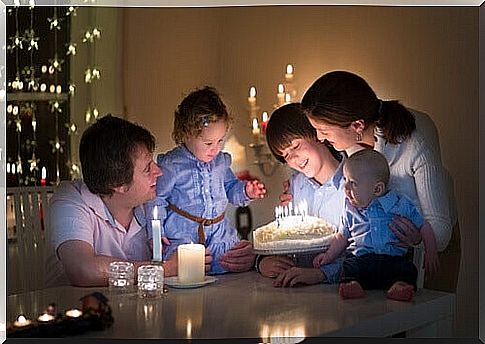Ten Historical Curiosities About Birthdays – Parenthood

What are birthdays?
Birthdays are, fundamentally, the celebration of a special event. What is this event? It is the day of a person’s birth. It is generally celebrated by organizing a party or the like. It is a reunion with friends and relatives.
You can find historical curiosities about birthdays. Many of them are really surprising.
Some interesting facts
The origin of the anniversary celebration dates back to a pagan holiday – predating Christianity. Most of the customs associated with this festival have their origin in magico-religious practices.
The initial purpose of lighting candles on a cake was to protect the birthday party from evil spirits. It was also sought that his well-being be guaranteed for a year.

The influence of the stars
This practice, originally pagan, is directly linked to astrology. Indeed, it is the astrologers who, by inventing calendars, succeeded in calculating birthdays.
At first, only the rulers could have control over this calculation. In other words, only the kings and members of the nobility and the high hierarchy of a locality. This was because their decisions and what would happen to them in life affected the whole of society. This is how calendar and horoscope went hand in hand.
Greece and Rome
In ancient Greece, men born on the same day gathered. They did it in exclusive clubs to celebrate it in private.
The Romans conquered the Greeks. Nevertheless, the Greeks influenced the Romans through their culture. This influence has spread all over the world.
The Greeks considered the existence of a protective spirit – which they called a daemon . This entity appeared on the day of a man’s birth and had the mission of accompanying him for life.

Christianity
The opposition of Christianity
Because of these practices in relation to magic, Christianity has been slow to accept the celebration of the anniversary. Christians were not only indifferent to it, they were opposed to it.
In its early days, Christianity was vigorously opposed to the celebration of any practice. Whether pagan or magical-religious, she questioned the idea of the existence of a single God. Or if this festival attributes magical powers to elements of nature such as the stars.
Later, as the Catholic religion was consolidated in Rome, this tradition ceased to be frowned upon. It should be borne in mind that Catholicism adopted several pagan traditions. However, we did not celebrate the day of birth but we commemorate All Saints.
One of the historical curiosities about birthdays is related to the expansion of this holiday. In Rome, when Christianity became the dominant religion, there was a need to assign a birthday to Jesus.
Biblical and religious birthdays
The Bible only records two birthdays. The first is that of King Herod who, among other things, ordered that the head of John the Baptist be brought to him for his birthday.
The second account in the Bible about a birthday is that of Pharaoh. To celebrate, he had the idea to have the chef of bakers executed on his birthday.

The most “famous” birthday in the world is that of Jesus on December 25th. He was assigned this date not for a historical reason but to link it to a pagan festival. This date corresponded to a feast during which the rebirth of the sun was celebrated. Indeed, it coincided with the winter solstice (in the northern hemisphere).
Long birthdays
There are birthdays that are celebrated for nine days. Others are celebrated collectively during the Lunar New Year, as in Vietnam. Many Muslims, meanwhile, do not celebrate birthdays due to a tradition linked to the Prophet Muhammad.
There are more and more traditions that enrich or make special this thousand-year-old celebration, which has not always been well accepted.
Today, we seek to celebrate life and love for those who are celebrating their birthday. In the West, it is usually celebrated with a cake decorated with candles and in the company of the closest people who gather to wish him good wishes.









